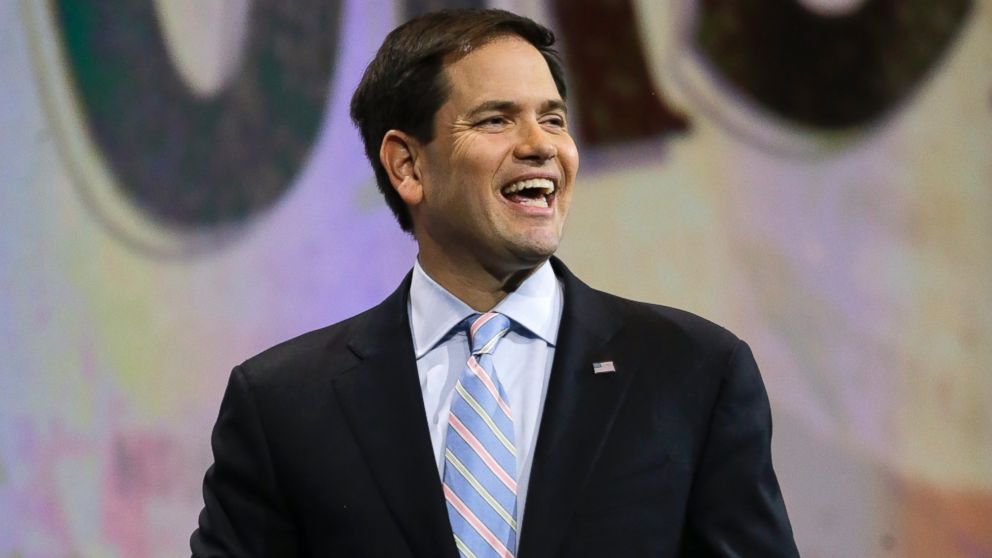As Donald Trump Riles GOP Race, Marco Rubio Begins to Connect With Voters In Spanish

— -- On the campaign trail this week, Marco Rubio chatted with a woman from San Salvador. Claudia Steele, who is now an American citizen and a voter, eagerly told him she would do everything she could to support his presidential bid. Rubio thanked her, and the two discussed politics and family — all in Spanish.
When Steele told Rubio she was the only Latina member of her local Republican organization, Rubio answered, smiling, "Hay que cambiar eso.” (Translation: “We need to change that.”)
But this wasn’t downtown Miami. It was a western suburb of Des Moines, Iowa.
While Republicans worry recent comments by Donald Trump comparing illegal immigrants to rapists and drug dealers may harm the party’s chances with Hispanic voters during the 2016 election cycle, the 44 year-old Senator from Florida was welcomed with open arms — quite literally — by the Spanish speakers who came to meet him over the course of his three-day swing in Iowa.
According to 2003 U.S. Census bureau, just 5.5 percent of the population of the Hawkeye State identifies as Hispanic or Latino, but more than a few found Rubio this week.
Steele said she thinks it’s important Rubio speaks Spanish. "It helps him communicate and connect with the community," she said in an interview with ABC News. (Fellow GOP candidate Jeb Bush is also a fluent Spanish speaker).
At the same event Steele attended, held by the Westside Conservative Club in Urbandale, a waitress originally from Barcelona happily conversed with Rubio in Spanish, and later hugged him goodbye.
In Cedar Rapids, Sydney Speltz, whose mother is a Colombian immigrant, said she would definitely be voting for Rubio.
"It's just really inspiring to see a fellow Hispanic be so successful," said Speltz, who works at the Cedar Rapids Country Club, where Rubio hosted the Linn Eagles Lunch.
In Davenport, Morena Gonzales-Castro Hausuer, originally from El Salvador, showed up to hear the Florida senator and son of Cuban immigrants.
"I do believe that he is the one who has the right ideas, the right points about what is going to happen to our youth if we don't change our policies," she said.
This week — like many of his fellow candidates — Rubio was asked to address whether Trump’s recent comments were hurting the Republican Party. He said he thinks voters are “capable of distinguishing between Donald Trump and the Republican Party.”
“I obviously strongly disagree with him,” Rubio told reporters at a campaign stop, reiterating that Trump’s comments were "inaccurate, they’re offensive, and they’re divisive.”
Democratic presidential candidate Hillary Clinton, on the other hand, argued that all of the GOP candidates are “in the same general area on immigration.” (Rubio dismissed Clinton’s comments as “silly talk”).
"We have a right to enforce our immigration laws,” Rubio told reporters. “That’s not hostility, that’s sovereignty.”
Gonzalez-Castro Hausuer agreed.
“I believe if someone wants to be in this country, they can come to this country, but they have to do it legally," she said, detailing the lengthy and costly immigration process she had to navigate in order to move to Iowa with her U.S.-born husband.
"But that is the way it should be," she added.
Steele, Gonzalez-Castro Hausuer, and Speltz all said what they liked most about Rubio were his ideas for higher education reform. Neither cited immigration as a top priority, but Speltz acknowledged she saw it as a kind of litmus test for candidates' general opinion of Hispanics.
“I feel that some Republicans are too tough on immigration, and don’t show a lot of respect for people from Mexico and South America,” she said, referring to Trump. "But I definitely don’t think Republicans as a whole are anti-Hispanic.”




